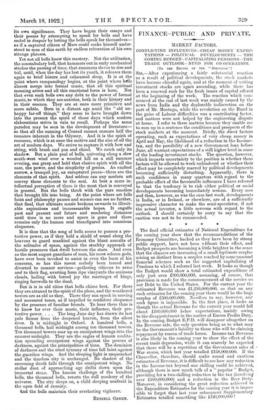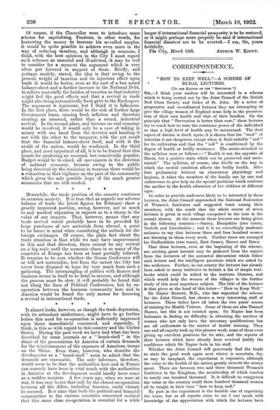FINANCE—PUBLIC AND PRIVATE.
MARKET FACTORS.
CONFLICTING INFLUENCES—CHEAP MONEY EXPEC- TATIONS — POLITICAL DEVELOPMENTS — THE COMING BUDGET—CAPITALIZING PENSIONS—THE TRADE OUTLOOK—NEED FOR CO-OPERATION.
[To THE EDITOR 07 THE " SPECTATOR."] SIR,—After experiencing a fairly substantial reaction as a result of political developments, the stock markets have become cheerful again, and at the moment of writing investment stocks are again ascending, while there has been a renewed rush for the fresh issues of capital offered at the beginning of the week. The reaction which com- menced at the end of last week was mainly caused by the news from India and the deplorable indiscretion on the part of Mr. Montagu, while the revolution on the Rand in the guise of Labour difficulties was a contributing factor, and matters were not helped by the engineering dispute at home. I refer to these matters because they enable me to sum up in a sentence the conditions and prospects of the stock markets at the moment. Briefly, the direct factors operating, such as expectations of very cheap money in April and May, the likelihood of a reduction in the Income- tax, and the possibility of a new Government loan before June, all warrant expectations of a still higher level insome of the leading investment stocks. The question, however, which imparts uncertainty to the position is whether these factors will be allowed to work unhindered or whether their effect may be completely marred by political developments becoming sufficiently disturbing. Apparently, there is such confidence in many quarters with regard to the probable effect of the favourable influences I have referred to that the tendency is to risk either political or social developments becoming immediately serious. Every now and then, however, as was the case last week, developments in India, or in Ireland, or elsewhere, are of a sufficiently impressive character to make the semi-speculator, if not the actual investor, a little nervous with regard to the outlook. I should certainly be sorry to say that the caution was not to be commended.
The final official estimates of National Expenditure for the coming year show that the recommendations of the Economy Committee, backed as they have been by strong public support, have not been NN ithout their effect, and Budget prospects are becoming a little brighter in the sense that the chances are increasing of a small legitimate surplus arising as distinct from a surplus reached by some unsound financial schemes such as the suggested capitalizing of Pensions to which I referred last week. It looks as though the Budget would show a total estimated expenditure of only just over 000,000,000, assuming, of course, that provision is made for the commencement of the service on our Debt to the United States. For the current year the estimated Revenue was £1,216,000,000, so that on any such estimates for the coming year there would be the huge surplus of £300,000,000. Needless to say, however, any such figure is imliossible. In the first place, it looks as though the actual Revenue for the current year would fall about E100,000,000 below expectations, mainly owing to the disappointment in the matter of Excess Profits Duty. In the coming Budget E.P.D. will disappear altogether on the Revenue side, the only question being as to what may be the Government's liability to those who will be claiming repayment by reason of trade losses. Income-tax Revenue is also likely in the coming year to show the effect of the recent trade depression, while it can scarcely be expected that there will be a repetition of the Government sales of War stores, which last year totalled £158,000,000. If the Chancellor, therefore, should make sound and cautious estimates of Revenue, it is difficult to see how any reduction in the Income-tax beyond one shilling could be achieved, although there is now much talk of a ' popular " Budget, providing for a two-shilling reduction in the tax (involving over £100,000,000) and a reduction in the Beer Duty. Moreover, in considering the great reduction achieved in the Expenditure Estimates for the coming year it is impos- sible to forget that last year subsequent Supplementary Estimates totalled something like £120,000,000! Of course, if the Chancellor were to introduce some scheme for capitalizing Pensions, in other words, for borrowing the money to increase his so-called surplus, It would be suite possible to achieve even more in the way of reducing taxation, and although in common, I think, with the best opinions in the City I must regard such schemes as unsound and ill-advised, it may be well to consider for a moment the argument which is very often put forward in support of them. Briefly, and perhaps crudely, stated, the idea is that owing to the present weight of taxation and its injurious effect upon , trade it would be better, even at the cost of a less sound balance-sheet and a further increase in the National Debt, to relieve materially the burden of taxation so that industry might feel the good effects and that a revival in trade might also bring automatically fresh grist to the Excheciner. The argument is ingenious, but I think it is fallacious. In the first place, there would be the risk of further large Government loans, causing fresh inflation and therefore creating an unsound, rather than a sound, industrial revivaL In the second place, and because no real economy would be involved, it would only be a case of taking in money with one hand from the investor and handing it out with the other to the taxpayer, with the net result that the financial balance-sheet itself, and with it the credit of the nation, would be weakened. In the third place, and most important of all, it is to be feared that this means for producing an unsound, but conceivably popular, Budget would be to check all movements in the direction of national economy, because owing to the public being deceived by the remission in taxation there would be a relaxation in that vigilance on the part of the community which gives the only possible hope of the much greater economies that are still needed_ . Meanwhile, the trade position of the country continues to occasion anxiety. It is true that as regards our adverse balance of trade the latest figures for February show a greatly improved position, owing, however, not so much to any marked expansion in exports as to a slump in the value of our imports. That, however, means that any trade revival would probably have to be preceded by large purchases of raw materials from abroad, a point to be borne in mind when considering the outlook for the foreign exchanges. Of course, the plain fact about the trade situation is that while we may have improvement in this and that direction, there cannot be any revival on a big scale until the economic chaos in so many of the countries of Europe has been at least partially relieved. It remains to be seen whether the Genoa Conference will or will not materialize, but from the outset the City has never been disposed to hope for very much from such a gathering. The intermingling of politics with finance and business seems in itself to be fatal to success, and although the process must be slow, it will probably be found that not along the lines of Political Conferences, but by co- operation between the business community here and in America would be found the only means for financing a revival in international trade.
It almost looks, however, as though the trade depression, with its attendant misfortunes, might have to go further before this need for co-operation is sufficiently impressed upon those immediately concerned, and especially, I think, is this so with regard to this country and the United States. During the past week we have had what has been described by some journals as a " bomb-shell " in the shape of the presentation by America of certain demands for the reimbursement of the expenses of American troops * on the Rhine. Even those, however, who describe the development as a " bomb-shell " seem to admit that the demands are reasonable. The only inference, therefore, would seem to be that the authorities here and in France can scarcely have been in vital touch with the authorities in America or the development would hardly have come as a sadden surprise. A few years ago, when we were at war, it was easy to see that only by the closest co-operation between all the Allies, including America, could victory be secured. It is time that both the political and financial communities in the various countries concerned realized that this same close co-operation is essential for a while longer if international financial prosperity is to be restored, or it might perhaps more properly be said if international financial disasters are to be averted.—I am, Sir, yours faithfully,



































 Previous page
Previous page